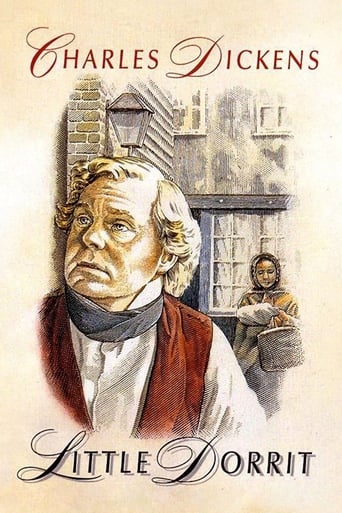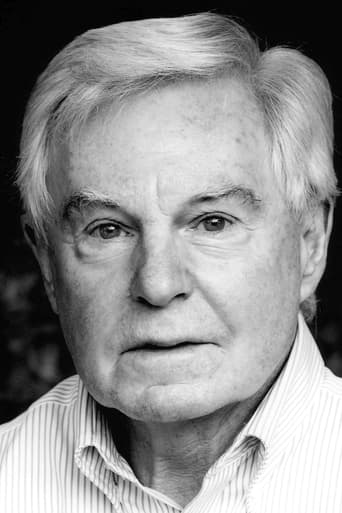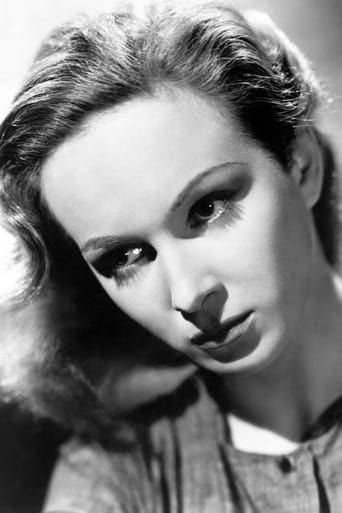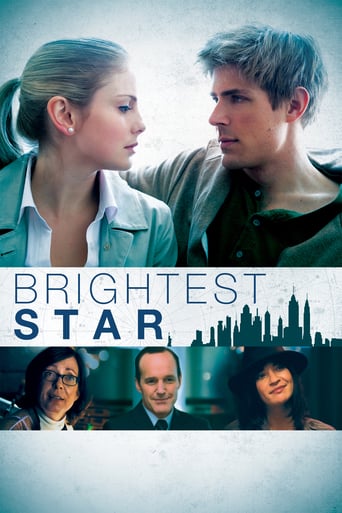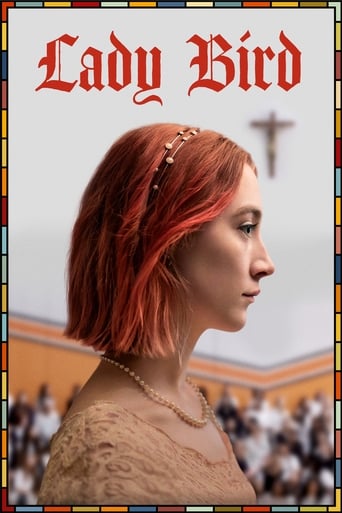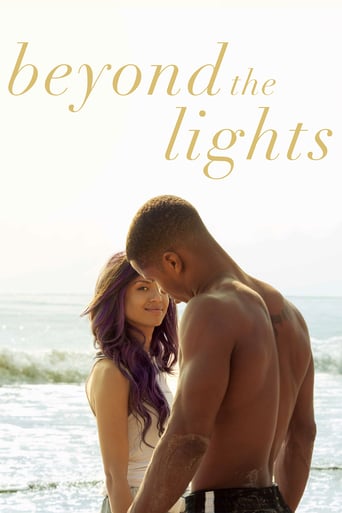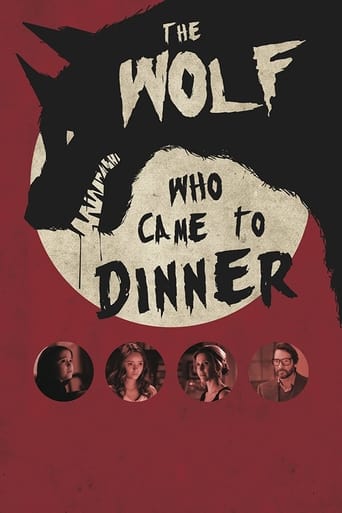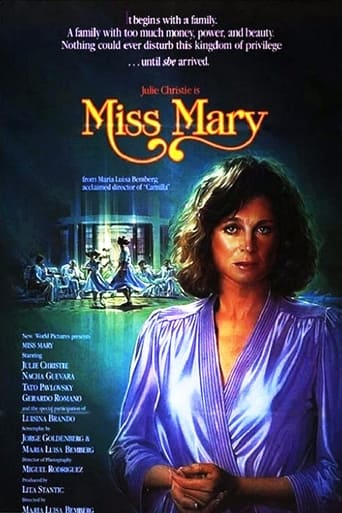Little Dorrit (1987)
A drama based on the novel by Charles Dickens which tells the story of Arthur Clennam who is thrown into a debtor's prison. There he meets a young seamstress whose father has been imprisoned for twenty-five years. A film in originally released in two parts.
Watch Trailer
Cast


Similar titles
Reviews
Don't Believe the Hype
Best movie ever!
After playing with our expectations, this turns out to be a very different sort of film.
All of these films share one commonality, that being a kind of emotional center that humanizes a cast of monsters.
Not terrible by all means, but I did find myself underwhelmed watching this Little Dorrit. The book is such a mammoth book, an insightful and blistering piece of literature, but like a lot of Dickens' work very difficult to adapt. Previously I had seen the 2008 BBC version, which I absolutely loved, finding the performances outstanding(especially Tom Courtenay and Andy Serkis) and the whole production rich in detail.I can definitely understand why some would have a lot of affection for the 1988 Little Dorrit. Production-values-wise it does look wonderful, with the sets evocatively rendered while never looking too clean and the costumes beautifully tailored. The photography is skillful as well. Miriam Margoyles and Pauline Quirke impress, but there are three especially outstanding performances. Derek Jacobi, whose Arthur Clennam is outstanding with an ability sometimes to say so much without saying much. Sarah Pickering whose Amy is every bit as appealing as Claire Foy in the 2088 mini-series, except here I feel the character is written in a more sympathetic way. And Alec Guinness, whose heart-wrenching performance as William Dorrit makes for one of his finest screen performances.But I can also see why others mayn't like this version too much. Of the acting, I was disappointed in the Flintwitch of Max Wall, he is a good physical actor but saying his lines is another story, I felt he did overdo it. I do admire the effort to include as much of the dialogue as much as possible, but at the end of the day the whole script came across as too wordy and in some scenes overlong. In regards to the music, I preferred the simpler and more subtle one in the 2008 version, here it was overbearing and had a danger of drowning out the dialogue, then again it could've been to do with the sound which was rather muffled. But it was the pace and the storytelling that didn't work the most for me. I do think a slow pace was necessary in the first place considering the sprawling and mammoth nature of the story, but with the pauses, mumbling and lifeless crowd scenes I did actually find it almost insufferably dull pace-wise. And if I hadn't read the book or seen the 2008 mini-series, I don't think I would have been confused by what was going on in this adaptation. I didn't like that it was in two 3-hour parts focusing mainly on either Arthur or Amy and making other characters come and go without elaborating on much(such as Casby being called a hypocrite and the rise and fall of Mr Merdle for examples), as well omitting Tattycoram and one of Dickens' best ever characters Rigaud.All in all, has some good stuff like the period detail and three outstanding performances, but pace and story-wise this Little Dorrit was disappointing. 5/10 Bethany Cox
In addition to describing the progression of my regard for this film as I watched it, these are the names of the last three chapters of the book, a book which, as usual (with Dickens adaptations), the writers of this film had not read - or at least had not read recently enough.Most of the performances were fine. Alec Guinness was spot on, and the little woman playing Amy was perfect. At first I hated the Fanny performance - and then I remembered that I hated Fanny, so she was also perfect. Arthur could have been played with a little more enthusiasm, and without all the whispering. The actor playing Tip likely never went far. But all in all, the acting was acceptable.Where this film failed, and failed completely, was in the telling of the story: in the writing, directing and editing. First, of course, was the ludicrous vertical splitting of the film into two character-centric/perspective parts to be presented sequentially. This was a horrible idea on every conceivable level, but most importantly, it resulted in the disconnection of important elements of Arthur's story and Amy's story, that must play upon one another in order to build the drama and advance the story. These connections being brutally severed, the story and all of its intensity were lost.If that were not enough, there was so much more ill-advised meddling on the part of the writer and director, that it alone would have ruined the film - at least for readers. Anyone who has read even the cheat notes for Little Dorrit must have wondered and been dismayed at the absence of numerous important characters. Most notably, they must have asked, 'where is Rigaud?' This story can't be told without Rigaud! It is through this colorful and evil character, "with his nose coming down over his mustache, and his mustache going up under his nose," who is blackmailing Mrs Clennam, with the help of Flintwich, that Mrs. Clennam's secret is revealed, and his involvement is essential to the building suspense surrounding this secret - of which suspense, as a consequence of Rigaud's absence, there was not a trace in this film. And since there is no Rigaud it follows, perhaps, that there would be no Cavalleto, another uniquely Dickensian character who was sorely missed. Rigaud is also an important evil element among the Dorrits abroad, where he teams up with the dissipated Henry Gowan - who is also, sadly, never seen again in this film after he marries Pet.So little is made of the Meagles family, a major omission in itself, that I suppose it is no surprise that there is no Tattycoram, and since there is no Tatty, there is no Mrs. Wade: more great losses for the audience, since their highly charged and emotional subplot helps to define and humanize the characters of the Meagles family and of Arthur. Mrs. Wade of course also plays an important part in the Rigaud - Flintwich - Mrs. Clennam story.The Murdles are so overlooked in this telling, that one may wonder, when Mr Murdle shows up at Fanny and Sparkler's apartment to ask for a pen knife (with which he later commits suicide), who he is and where he came from at that point. Among other hard-felt losses stemming from this neglect, is the missed opportunity to engage in some of the fun that best exemplifies Dickens' sense of humour and satire. The parties at the Murdles, with all of the sycophants that are named only by their professions (Bar, Physician, Clergy etc.), and the head butler that terrorizes the great Mr. Murdle. All gone!Since there was no developing Rigaud blackmail subplot, readers knew well in advance that the end of the film would have to be substantially re-organized, and that it would be awful; and it was. Dickens version of the story behind Mrs. Clennam's secret is, of course, quite complex, but certainly worth accurately telling, since it is the motivation for the entire plot! But no! Now we are expected to accept the story that there is money in the house that Frederick had sent for Amy, and that Mrs. Clennam had held back? How absurd! Frederick has been in contact with Amy her whole life; so if he had money for Amy, he would have just given it to her. Of course the real story was this: Old Mrs. Clennam's father had forced her and Arthur's father into marriage, when Arthur's father was actually in love with another woman (Arthur's real mother, who lived with and was provided for by Frederick), an affair that when discovered by Mrs. Clennam, sent her into an old testament rage, in which she took the baby (Arthur)to raise and drove his real mother into an insane asylum and eventually into her grave. When Mrs. Clennam's father died, he felt remorse for what he had done, and left part of his estate to Arthurs real mother, or, if she was not living, to the youngest female kin (Amy!) of the real mother's caretaker (Frederick!). Yes, complicated, but not if it's told right.As much as this film was brutalized and its audience cheated by the cruel omissions and alterations in this story, which I have only highlighted here; it must also be noted that by dint of scandalously flawed directing and editing, what remained of the story managed to drag on miserably, with inordinately long pauses between lines, painfully slow pans to make small points,and long, lingering scenes in which nothing actually occurs.My recommendation: do not waste six hours watching this. In that much time you could be well into reading the actual book, which is terrific. Get the Penguin Classics version - it has all the original illustrations, wonderful, informative extras including very well done end notes. Will no one ever properly adapt a Dickens novel to film?
The recent TV adaptation of Little Dorrit sent me out in search of this movie version, which I hadn't seen since its original release.This mammoth project was written and directed by Christine Edzard and is the closest that cinema has come to capturing the richness of a Dickens novel. I enjoyed seeing it again on DVD, but I was disappointed to find it was not nearly as good as I had remembered it.The performances are variable, as you would expect with such a massive cast. However, the leads are generally pretty good.Derek Jacobi's melancholy is always arresting (and sorely missed in the TV version) but his performance overall lacked some light and shade.Alec Guinness effortlessly conveys the patrician pretensions of the imprisoned Mr Dorrit (better than Tom Courtney) but we don't get enough of his underlying anxiety when he is released, so his mental breakdown is sprung on us without adequate preparation.Sarah Pickering is steered through the picture without mishap and is an acceptable Amy, but is clearly not an experienced actor and this appears to be her only screen credit.In accordance with a long-established tradition a number of the minor characters are played by comics and comic actors. Sometimes this works, sometimes not. This movie is no different.Patricia Hayes is a good character actor, but for British viewers she carries too much baggage. She is having to fight against her normally forceful personality to play the timorous, oppressed Affery.Similarly, Bill Frazer is best known for his comedy work, where he typically plays a blustering bully. This comic persona is not quite right for the bogus Casby, but the problem here is not Frazer's performance but the strangely truncated part.Max Wall was a master of physical comedy who became the darling of 'intellectuals' but he was not an actor and his Fintwinch is not a performance.Flora was based on a woman Dickens actually knew and his depiction of her was rather cruel. Miriam Margolyes's comic monster may be faithful to Dickens but misses the opportunity to suggest an underlying sadness in Flora.Of the comics, Pauline Quirke fares best and gives a lovely performance as the mentally-arrested Maggy.However, my main reservations concern Edzard's screenplay and direction.She took an unusual approach to this long book. Instead of just breaking it in half, she extracted two parallel story lines and gave us two overlapping first person narratives: Arthur is in every scene in the first movie and Amy is in every scene in the second one. I don't think this experiment really works.The problem is that Dickens wrote very much in the third person. His complex plots are told through a wide range of characters, spanning the whole social spectrum, and the story moves forward on a broad front. In this book there is too much going on outside the direct experience of Arthur and Amy for a coherent story to be told entirely from their perspectives. Characters pop in and out of the action without us knowing enough about who they are and how they relate to the leads. Things happen without sufficient justification. For example, Pancks denounces Casby as a hypocrite without us seeing any of the hypocrisy. Important plot developments, such as the rise and fall of Mr Merdle, appear out of nowhere.The first movie, in particular, suffers from this approach. There are noticeable gaps that are only filled in the second movie (if at all) and key narrative strands, such as Arthur's relationship with his mother, are left hanging unresolved. This leaves us intrigued and wanting to know more, which is probably why Edzard did it this way. However, it also means the whole of the first movie becomes a teaser - but it is a three-hour teaser!I also feel that Ezard is too indulgent with Dickens's dialogue. It is often great, but he wrote for the page, not the screen, and his wordy speeches need severe editing to make them speakable. Edzard sometimes lets them run on too much, leaving scenes over-written and over-long. Overall, I felt she could have used the six hours more effectively.I also felt that Edzard's relative inexperience as a director was evident on a number of occasions.In some scenes, the pacing and rhythm is not quite right. In the early stages, in particular, she choreographs Derek Jacobi in slow motion and there are agonising pauses between lines. Elsewhere, her staging is often too theatrical. Characters whirl around the set, going in and out of shot at random, with the camera trailing in their wake. In simple dialogue scenes she hold shots for too long: dwelling on the speaker when when the scene is crying out for a reaction shot. Simple devices, like montages and flashbacks, are curiously unconvincing in ways I immediately sensed but cannot quite describe.It doesn't help that the sound recording is quite poor (at least on the DVD). I sometimes struggled to pick up individual lines. When Arthur learns of a death abroad, I didn't actually hear who had died and had to wait several minutes to find out. At times, the garrulous Flora could have been speaking Martian for all I knew.I applaud the ambition of this project, but it is a bit of a mess. It can be a moving, engrossing and thoroughly enjoyable mess. But it is still a mess. It is so manifestly a clunky piece of film-making that I am at a loss to understand the rapturous praise it has received from other IMDb reviewers.However, I appear to be in a minority of one, so I suppose I must expect to get slaughtered if anyone ever gets round to reading my own comments.
A great novel, and a great movie. BUT! A few observations...I understand that the novel is very complex, that the plot turns in a number of layers, and that the film is already of great length. However I think it is seriously lacking to omit rather major elements and characters, such as the villain Blandois upon whom much of the plot turns. And I was disappointed as well to see Tattycoram (which would be such a delightful part for any actress!) left out. But these things aside, it is still a favourite movie which I've watched (on VHS) many times. The colourful characters are marvelously Dickensian as portrayed by the cast, most notably Guinness, Greenwood, Max Wall, Roshan Seth, and Jacobi. Has Sarah Pickering appeared in anything else? She was convincing in her character too. Though seventeen years old now, the film continues to delight and entertain, but I sure miss Blandois and Tattycoram!

